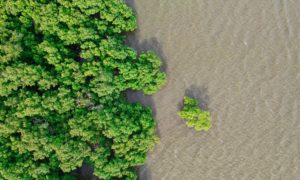Événement Ciné
Wednesdays for the Planet | Nature-based Solutions

Wednesdays for the Planet is a series of online screenings and virtual presentations with experts highlighting the natural world and other environmental challenges our planet faces. The virtual screenings are for educational purposes, non-profit and non-commercial.
Reportage
Nature-based Solutions
Presented by CNBC International TV in their Sustainable Energy series, the reportage takes a look at how nature-based solutions can help various industries become more sustainable and in mitigating environmental issues.
* Article from CNBC:
Nature-based Solutions? Here’s What They Are and Why You Should Care
It’s over four years since the Paris Agreement was reached at the UN’s COP21 climate summit. It was in the French capital that world leaders committed to making sure global warming stayed “well below” 2 degrees Celsius above pre-industrial levels. They also agreed to pursue efforts to limit the temperature rise to 1.5 degrees Celsius.
In the time that’s passed, the debate on climate change has intensified a great deal. Today, it’s one of the most talked about and polarizing issues on the planet.
While activists decry what they perceive to be a lack of action when it comes to tackling the “climate emergency”, national governments and big businesses claim they are making significant efforts.
Could Nature Hold the Key?
Taking all of the above into account, something called “nature-based solutions” (NbS) could have a role to play in the years ahead. The EU has described nature-based solutions as “actions which are inspired by, supported by or copied from nature.”
An example is the installation and cultivation of green roofs and walls in urban areas to boost air quality.
Speaking to CNBC’s “Sustainable Energy,” Stewart Maginnis, global director of the Nature-based Solutions Group at the International Union for Conservation of Nature, explained that these solutions were “rooted in the benefits that nature provides.”
“Real, tangible benefits like sequestering carbon, stabilizing soil, regulating water flow,” he added, explaining that NbS came from well managed or restored ecosystems like forests, wetlands and grasslands.
A Bridge to a More Sustainable Planet?
While the concept of NbS may seem intangible or abstract, a number of high profile-organizations are continuing to highlight just how fragile our planet is.
In the World Economic Forum’s latest Global Risks Report, for instance, its top five risks by likelihood across the next decade were listed as: extreme weather events; the failure of climate change mitigation and adaptation; major natural disasters; major biodiversity loss and ecosystem collapse; and human-made environmental damage and disasters.
When viewed through this sort of prism, nature-based solutions could have a big role to play in both the here and now, and years ahead.
“The value of nature-based solutions is that they are ready to be deployed now, particularly when we look at the context of climate change,” Maginnis said.
“But, even with the best will in the world, decommissioning power stations, shifting to electric vehicles … refitting homes will take time, and that’s time we don’t have.”
“So, nature based solutions act as a real, effective and readily available complement to the other actions that we need to take,” he said. “It’s not a reason not to take those actions — in fact, it’s a bridging mechanism to help us get safely to a 1.5 degree future.”
Nature-based Solutions
According to the United Nations Environment Programme (UNEP), nature-based solutions are locally appropriate actions that address challenges such as climate change and provide human well-being and biodiversity benefits by protecting, sustainably managing and restoring ecosystems.
They are an umbrella term that includes approaches such as Ecosystem-based Adaptation and Ecosystem-based Disaster Risk Reduction. Nature-based solutions are a fundamental part of any action for climate and biodiversity, and are an essential component of the overall global effort to achieve the goals of the Paris Agreement on climate change.
Some countries have already taken clear steps and initiatives to include nature-based solutions to tackle the climate emergency, for example, the European Green Deal, which is a multi-billion Euro action plan to boost green energy investments, create green jobs while promoting ecosystem restoration. At the 2019 Climate Summit, the Nature-based Solutions for Climate Manifesto was supported by 70 governments. Nature-based solutions are also central to the United Nations Framework Convention on Climate Change (UNFCCC) climate talks taking place this November 2021 in Glasgow. The UK presidency has highlighted nature and nature-based solutions as one of five areas that needs particular attention.
However, UNEP’s Adaptation Gap Report 2020 found that while countries have tabled adaptation projects that include nature-based solutions into their policy plans, investment and implementation of these projects needs to be urgently ramped up. The report also finds that increasing financing for and scaling up nature-based solutions will be particularly critical to help meet the goals of the Paris Agreement.
In this video below, Ingrid Andersen, Under-Secretary-General of the United Nations (UN) and Executive Director of UNEP, speaks about NbS in an interview excerpt from the Partnership for Environment and Disaster Risk Reduction (PEDRR) Massive Open Online Course (MOOC) on Nature-based Solutions (NbS) for Disaster and Climate Resilience.
Online Screening
Links
- Geneva Nature-based Solutions Dialogues | Geneva Environment Network (GEN)
- Nature-based Solutions Update | GEN
- Nature-based Solutions for people and planet | IUCN
- Nature-based Solutions for Disaster and Climate Resilience – MOOC | PEDRR
